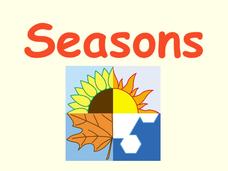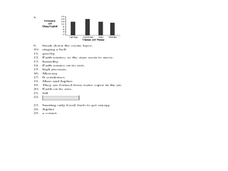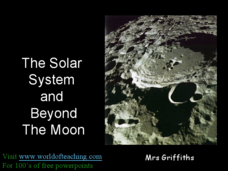Curated OER
The Reasons for the Seasons
Sixth graders conduct a controlled investigation to determine the length of the sun's shadow on a fixed object (i.e., flagpole, telephone pole, etc.) over a three-day period (one day in the fall, one in the winter, and one in the...
Curated OER
Seasons Worksheet
Middle and high schoolers are given a diagram of the Earth rotating around the Sun. They label the seasons in the proper place, highlight special days such as the vernal equinox and autumnal equinox, the dates the special days fall on,...
Curated OER
Modeling the Change of Seasons
Students evaluate data to determine changes in length of day. They model the revolution of Earth around the sun to show changes in length of day and sun angle and illustrate how the sun angle affects the change of season.
Curated OER
Planet Earth
In this Earth worksheet, students review 13 terms associated with the Earth's rotation, revolution, and orbit. Students find the terms in a word search and then fill in the term next to its definition.
Curated OER
Earth's Place in Space
In this Earth worksheet, students review how the revolution, rotation, and tilt of the Earth effects the Earth. This worksheet has 4 matching and 3 short answer questions.
Purdue University
Sun Tracking System for a Solar Panel
Capture the Sun's rays as best as possible. An engaging STEM instructional activity teaches scholars about how Earth's tilt causes the path of the sun to change throughout the year. They create solar panel systems that move both...
Curated OER
Tides, Eclipses, Day and Night, and Seasons
In this earth science worksheet, learners use the clues given at the bottom of the sheet to complete the crossword puzzle on tides, eclipses, day and night, and the seasons of the year. There are 17 clues to solve in the puzzle.
Curated OER
Seasons
Ask your class if they can determine which season is being represented by each of the four seasonal slides. Spring, summer, autumn, and winter are represented with typical holiday and weather images. Tip: Use actual images that show...
Curated OER
Season's Greetings
Students explore Earth's seasons using an interactive website. In this earth science lesson plan, students watch video segments and explain Earth's seasonal milestones. They discuss the factors that causes seasonal changes.
Curated OER
The Seasons
Discover the change of the seasons by modeling the Earth-Sun system. Learners model the orbit of the Earth around the sun and explore how and why the patterns of winter and summer occur.
Curated OER
Sundials and Shadows - What Can They Teach Us About Seasons?
Students collect and analyze data relating to seasonal changes. They view a video, research web sites and build a sundial to collect their data.
Curated OER
What Causes Day and Night?
Why do we have four seasons? A series of questions about the Earth's orbit and its impact on seasons challenge Earth science students.The second page of the resource has nine multiple choice questions, such as "One year on Earth is one...
Curated OER
The Earth in Space
Students use computer images to explain why the Earth has seasons and examine the phases of the moon. They create 3-D images and present them to the class. They answer a series of questions at the end of the lesson.
Curated OER
The Reasons for the Season
Students explain the reason for the changes in season. In this lesson examining the relationship between the Earth and the Sun, students use an applet to discover how the alignment of the Earth and the Sun cause the change in seasons.
Alabama Learning Exchange
The Sun and the Earth
Third graders study and diagram the positions of the Earth and sun during the four seasons. They predict weather for cities in the northern and southern hemispheres.
Curated OER
Models of the Earth and Moon
Students explore the earth's rotation and phases of the moon. In this planets instructional activity, students rotate and revolve around a light representing the sun. Students use movement and props to simulate what causes the phases of...
National Wildlife Federation
Wherefore Art Thou, Albedo?
In the sixth lesson in a series of 21, scholars use NASA data to graph and interpret albedo seasonally and over the course of multiple years. This allows learners to compare albedo trends to changes in sea ice with connections to the...
National Wildlife Federation
Why All The Wiggling on the Way Up?
Some of the CO2 emitted by burning fossil fuels is removed from the atmosphere by natural sinks, such as the ocean. The fifth engaging lesson in the series of 21 examines the CO2 data from three very different locations. It then makes a...
Curated OER
Seasons and Cloud Cover, Are They Related?
Students use NASA satellite data to see cloud cover over Africa. In this seasons lesson students access data and import it into Excel.
Curated OER
Fourth Grade Science Concepts Practice
In this grade 4 science worksheet, 4th graders complete 25 multiple choice questions covering a variety of 4th grade science concepts. An answer key is included.
Curated OER
What's Your Favorite Season?
Students explore earth science by creating illustrations in class. In this four seasons lesson, students identify the four different types of weather that take place during the year and read the books Harvest Year and Snow Comes to the...
Curated OER
Reason for the Seasons
Young scientists examine why we have seasons on Earth, and how the motion of the Earth around the Sun causes them. Groups of learners are given a variety of balls, a bamboo stick, a marker, and a flashlight, then use the objects to...
Curated OER
The Solar System and Beyond: The Moon
Here is a very basic look at the moon and its positioning around our planet. The pictures and labels here show different phases and will help your space explorers understand our changing views of the moon along with the Earth's tilt and...
Curated OER
My Angle on Cooling
Students explore how the angle and distance of an object can change it's temperature. After reviewing how the position of the Earth affects the temperature of the planet, student groups design and perform an experiment to test how...

























